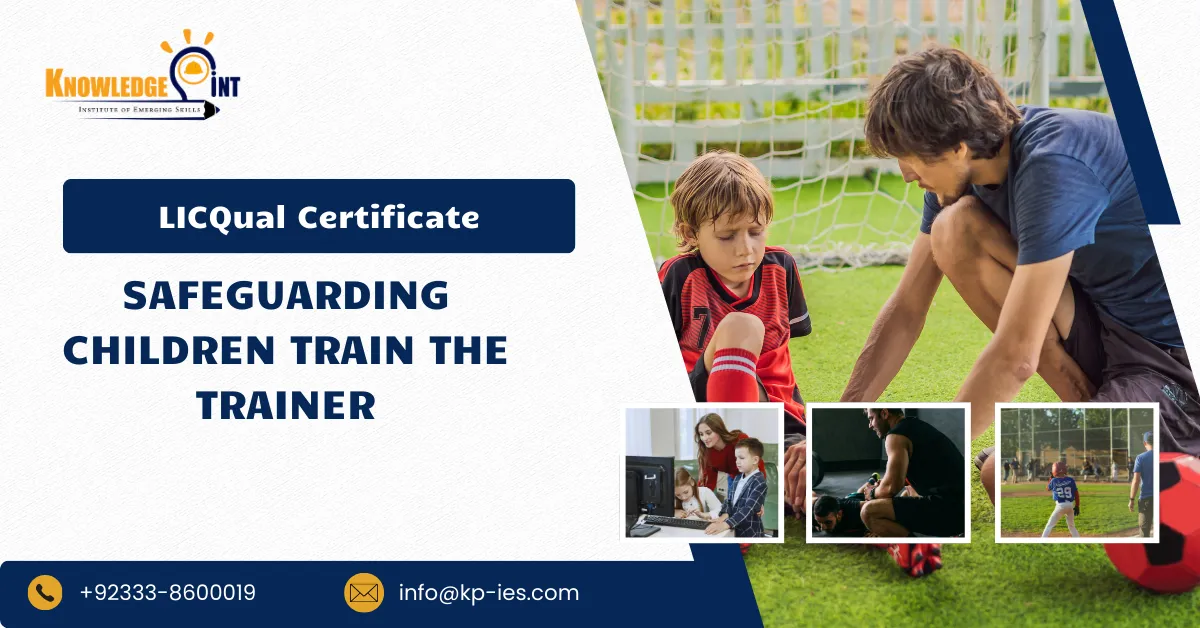The LICQual Certificate in Safeguarding Children Train the Trainer is a highly valuable qualification designed for professionals who wish to develop their expertise in safeguarding practices while also gaining the skills to train others in this critical field. Safeguarding children is one of the most vital responsibilities in education, healthcare, and social services, and this program ensures that trainers are fully equipped to deliver high-quality training that promotes child protection and welfare.
This course introduces learners to the fundamentals of safeguarding, including child protection principles, legal and regulatory frameworks, and the recognition of signs of abuse, neglect, or exploitation. Participants also gain an in-depth understanding of risk assessment and reporting procedures, ensuring they can confidently support staff and organizations in maintaining safe environments for children. Beyond subject knowledge, the course emphasizes the importance of effective training delivery. Learners are guided in designing and presenting engaging, interactive training sessions that are tailored to different audiences within the childcare, education, and health sectors.
By completing this qualification, participants not only strengthen their safeguarding knowledge but also develop the ability to train and mentor others, thereby amplifying their impact in safeguarding practices. The program supports trainers in building confidence, handling sensitive topics with care, and managing challenges that may arise during training sessions. Moreover, the course includes modules on evaluating training effectiveness, allowing trainers to ensure continuous improvement in safeguarding awareness across their organizations.
Course Overview
The LICQual Certificate in Safeguarding Children Train the Trainer consists of 6 mandatory units which are as follows.
- Introduction to Child Safeguarding
- Legislation and Policy Framework
- Recognizing Signs of Abuse
- Safeguarding Procedures
- Training Design and Delivery
- Facilitation and Communication Skills
Learning Outcomes for LICQual Certificate in Safeguarding Children Train the Trainer
Here are the learning outcomes for the LICQual Certificate in Safeguarding Children Train the Trainer:
1. Introduction to Child Safeguarding
- Understand the fundamental principles of child safeguarding.
- Recognize the importance of safeguarding in different professional settings.
- Demonstrate awareness of the roles and responsibilities of individuals in child protection.
2. Legislation and Policy Framework
- Interpret key laws, policies, and regulatory frameworks related to child safeguarding.
- Apply legal requirements and organizational policies in safeguarding scenarios.
- Ensure compliance with safeguarding standards within professional practice.
3. Recognizing Signs of Abuse
- Identify physical, emotional, sexual abuse, and neglect indicators.
- Develop the ability to assess risk factors and vulnerability in children.
- Respond appropriately when signs of abuse are suspected or disclosed.
4. Safeguarding Procedures
- Demonstrate knowledge of safeguarding reporting and referral processes.
- Apply safeguarding protocols in line with organizational and statutory requirements.
- Manage safeguarding cases with confidentiality, professionalism, and sensitivity.
5. Training Design and Delivery
- Design effective training programs on child safeguarding.
- Develop engaging training materials tailored to different learner needs.
- Apply effective delivery methods for safeguarding training.
6. Facilitation and Communication Skills
- Enhance communication skills for sensitive safeguarding discussions.
- Demonstrate effective facilitation techniques to engage participants.
- Manage challenges and resistance during safeguarding training sessions.
Course Benefits of LICQual Certificate in Safeguarding Children Train the Trainer
Here are the key benefits of the LICQual Certificate in Safeguarding Children Train the Trainer:
- Enhanced Expertise in Safeguarding: Gain in-depth knowledge of child protection, abuse recognition, and safeguarding procedures.
- Trainer Certification: Become a qualified trainer capable of designing and delivering safeguarding training programs.
- Improved Communication Skills: Develop strong facilitation and communication techniques to handle sensitive safeguarding topics effectively.
- Compliance with Standards: Understand legislation and policies to ensure compliance with safeguarding requirements.
- Professional Credibility: Strengthen professional standing in health, education, and social care sectors.
- Workplace Impact: Equip organizations with the skills to create safer environments for children.
- Career Advancement: Open pathways to senior roles in training, safeguarding, and child protection.
- Flexibility Across Sectors: Apply safeguarding knowledge in education, healthcare, childcare, and community organizations.
- Continuous Improvement Skills: Learn how to evaluate and improve safeguarding training programs for long-term effectiveness.
- Positive Social Contribution: Contribute to protecting vulnerable children and promoting safe, supportive environments.
Here are the future progression opportunities after completing the LICQual Certificate in Safeguarding Children Train the Trainer:
- Advanced Qualifications: Progress to higher-level diplomas or advanced certificates in safeguarding, child protection, or social care training.
- Specialization Pathways: Focus on specialized areas such as safeguarding in education, healthcare, or social work.
- Leadership Roles: Advance into supervisory or managerial positions in safeguarding, training coordination, or child protection services.
- Trainer Expansion: Deliver safeguarding training across multiple sectors, including schools, nurseries, healthcare organizations, and community groups.
- Policy and Advocacy Work: Contribute to the development of child protection policies and advocacy initiatives at organizational or governmental levels.
- Consultancy Opportunities: Work as an independent safeguarding consultant, supporting organizations with training, compliance, and safeguarding strategies.
- Further Academic Study: Pursue degrees or postgraduate studies in education, social work, psychology, or child welfare.
- International Opportunities: Apply safeguarding expertise in international NGOs, charities, and global organizations focused on child protection.
- Research and Development: Engage in research projects to improve safeguarding practices and training methodologies.
- Long-Term Career Growth: Build a career as a safeguarding specialist, training director, or child protection advisor.







